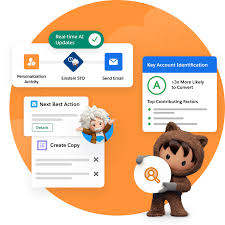Generative AI and Salesforce: Revolutionizing Digital Marketing with Einstein AI
Generative AI is a form of Artificial Intelligence that learns from existing content to generate new, creative outputs. Salesforce has long been at the forefront of AI innovation, primarily through its Einstein assistant, which has evolved to offer increasingly sophisticated solutions over time.
Artificial Intelligence: Key Concepts
Before diving into Salesforce’s AI capabilities, let’s clarify some foundational concepts. Artificial Intelligence (AI) refers to the creation of intelligent systems that can learn and reason autonomously. Within AI, Machine Learning (ML) plays a crucial role by enabling computers to learn from data and improve over time without explicit programming.
ML models fall into two broad categories:
- Supervised Learning: Algorithms learn from labeled data to predict outcomes.
- Unsupervised Learning: Algorithms identify patterns and classify data without labels or human intervention.
Deep Learning and Neural Networks
A more advanced subset of ML is Deep Learning, which uses neural networks to process large amounts of data and make autonomous decisions. Deep Learning powers technologies like voice assistants (e.g., Alexa or Siri), which can recognize speech and execute tasks.
A specific application within Deep Learning is Generative AI, capable of autonomously creating new content based on learned patterns from vast datasets. Another critical AI system is the Foundational Model, which is trained on enormous amounts of unstructured data from across the web, including text, images, and videos. These models offer a wide range of capabilities, such as generating text, answering questions, creating designs, or solving complex problems.
Salesforce Marketing Cloud and AI
Salesforce has utilizeded AI through its Einstein platform, which has evolved over time to offer a variety of data-driven tools. For example, Sent Time Optimization uses customer data to determine the best time to send emails to maximize engagement.
AI Tools in Salesforce Marketing Cloud
Salesforce offers several AI-powered tools for Marketing Cloud to help businesses leverage data for personalization and efficiency:
- ChatGPT – OpenAI Integration: Generates human-like content and engages directly with Marketing Cloud.
- Einstein GPT: Salesforce’s generative AI solution for both Service Cloud and Sales Cloud, enhancing automation and customer interactions.
- Marketing GPT and Commerce GPT: These tools enable automated marketing and commerce workflows, integrating with Marketing Cloud and Commerce Cloud to deliver personalized customer experiences.
The Einstein Trust Layer: AI in Salesforce CRM
Einstein is the first generative AI model integrated into a CRM, and Salesforce refers to its AI process as the Einstein Trust Layer. Here’s how it works:
- A “request” or “prompt” is initiated from the CRM, based on company-specific data.
- Dynamic Grounding ensures the prompt pulls relevant and contextual data to enhance the accuracy of AI-generated responses.
- The request is routed through a Secure Gateway, where the foundational AI model (Salesforce’s or a third-party like OpenAI) processes the data, delivering outputs like emails, images, or text while securing customer data.
Marketing Applications of Salesforce AI Tools
Salesforce’s AI tools can be applied across omnichannel marketing campaigns to hyper-personalize communication, increasing conversion rates and customer engagement. Predictive analytics also allow businesses to optimize cross-selling and upselling, offering tailored product recommendations based on customer behavior.
Chatbots powered by AI further enhance productivity by interacting in natural language, collecting leads, suggesting products, and resolving customer inquiries.
Salesforce’s Commitment to AI in Digital Marketing
Salesforce has been a pioneer in AI, continually expanding its capabilities through Einstein. With the latest AI tools for Marketing Cloud, businesses can now interact with customers more precisely, boost engagement, and optimize purchase predictions—paving the way for a new era in digital marketing.













